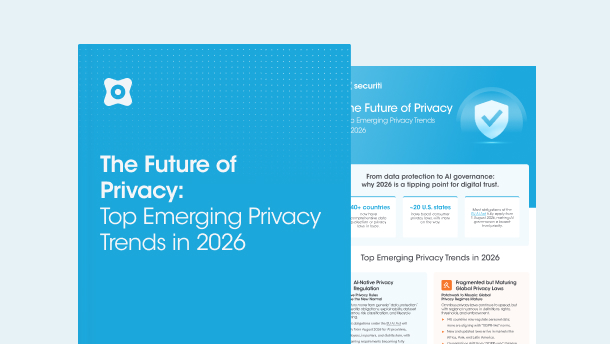What Is Privacy Awareness Training?
The goal of privacy awareness training is to inform the general workforce about the laws governing data privacy and the company's policies and ensure that both are followed internally and externally. Educating staff members about the distinction between data security and privacy is crucial for successful privacy awareness training.
Why is it Important to Have Privacy Awareness?
The risk of expensive incidents, reputational damage, regulatory penalties, and other negative effects gets significantly reduced when there’s privacy awareness and a culture of privacy by design. Privacy awareness is crucial to fostering public trust in a company, as without the culture of privacy; stakeholders would shy away from doing business with you.
Benefits of Privacy Awareness Training
The following information explains the advantages of privacy awareness training programs for individuals, businesses, and staff members:
- Demonstrates compliance with laws and regulations,
- Favors privacy-related legislation and regulations,
- Safeguards sensitive data for the company and safeguards the data of the employees,
- Creates robust organizational policies and programs,
- Creates a safe environment for all stakeholders,
- Creates a standard privacy and security posture,
- Broadcasts a point of contact for additional information,
- Identifies the multiple categories of sensitive data,
- Emphasizes any internal or external risks the business is or may face,
- Strategies for preventing identity theft,
- Safeguards the reputation of the company and offers institutional recognition.
Ways Privacy Awareness Training Help Transform an Organization's Employees
Privacy awareness training helps transform an organization's employees in the following ways:
Enhances Knowledge
Employees are taught about privacy laws, regulations, and best practices that they must adhere to while handling sensitive information residing within on-premise, hybrid, and multi-cloud environments across multiple jurisdictions.
Builds a Culture of Privacy
Regular privacy training instills a sense of responsibility and accountability in employees and helps to create a culture of privacy within the organization. Further, the employees can transfer the same learning to other employees during onboarding. This goes a long way in ensuring your organization stays clear of malpractice and inconsistency.
Minimizes Risk
Privacy training helps reduce the risk of privacy breaches by educating employees on identifying and preventing potential threats to sensitive information. It builds a proactive approach to handling intricate tasks rather than a reactive approach which can cost hefty penalties and reputational damage to the organization.
Improves Compliance
By educating employees on local and international privacy laws and regulations that apply to the business, organizations can ensure they comply with relevant regulations, reducing the risk of legal penalties and reputational damage.
Empowers Employees
Privacy training empowers employees to make informed decisions and take appropriate action when handling sensitive information, helping maintain that information's privacy and security.
What to Include In Your Privacy Training
Each organization is different. Naturally, the needs of each organization will be different as well. Once an organization decides that privacy training should be an essential part of an average employee's overall training and education, the next part is to decide what to include in this training.
Below are some areas any organization can focus on to ensure their employees have adequate privacy training and then expand upon it based on their unique needs.
Understanding Data
The centerpiece for any privacy training should be educating all employees on the importance and vulnerability of their data, particularly their personally identifiable information (PII) and sensitive data.
Whoever designs the privacy training course should ensure that there are appropriate resources within it to properly educate all employees about the distinction between all types of data and how to categorize them based on their importance. Particular importance should be given to data such as location, identification number, racial or ethnic origin, political opinions, religious beliefs, trade union membership, sexual orientation, health records, and biometric information.
Understanding Data Privacy Laws
Once your employees understand just how vital an asset their data is, in addition to how devastating it can be if it were to be compromised, it is essential to educate them on the various data privacy laws that are in place globally.
Going a step further than simply explaining what the laws entail for an organization, the employees must be educated on how an organization's overall compliance with these laws depends on the adaptation of certain practices by the employees and the organization as a whole.
There's no point in confusing them with jargon, so ensure that the laws and how they affect your current practices are explained in as simplistic terms as possible to ensure no ambiguity occurs.
Avoiding Social Engineering
Technology has developed in leaps and bounds over the past few years. However, as technology has grown, so have the methods of those that wish to use it for nefarious purposes. One such technique that is popularly used is known as social engineering.
The effectiveness of social engineering lies in just how easy it can be used to compromise an entire system using the most basic tools. Suppose an employee receives an email from a known contact with an almost legitimate-looking link or plugs in a USB drive they found lying around the company parking lot. It may seem bizarre, but it never fails to surprise just how many employees fall for these tricks and end up costing the organization millions in data breaches.
Proper training is necessary to educate employees in identifying and adequately reporting such social engineering attempts to avoid causing the organization any significant trouble.
Everyday Privacy Practices
Dedicated training to understand, implement, and evaluate sound privacy policies is a good idea. What makes these privacy policies so important is the fact that they are not rocket science. These are standard practices that an employee should be expected to follow irrespective of anything else.
Some privacy practices that an organization should emphasize for its employees include the following:
Additionally, organizations should also include password policies and email scams in privacy training for the following reasons:
Password Policies
Password security must be of the utmost importance, and a policy requiring not only the use of a singular password but also of multi-factor authentication whenever accessing confidential customer or employee data should be in place. Additionally, using a secure browser and locking the device screen when not using is also essential, along with using software with the most recent patches and updates that add an extra layer of security.
Strong password policies are crucial in protecting sensitive information and preventing unauthorized access. By including password policies in privacy training, employees can learn how to create strong and secure passwords and understand the importance of regularly updating them.
Email Scams
Email scams and phishing attacks are becoming increasingly sophisticated, making it essential for employees to know how to identify and avoid these threats. By including email scams in privacy training, employees can learn about the different types of scams, how to spot them, and how to report them.
The proper privacy training will equip staff members with the knowledge to distinguish between genuine and fraudulent requests (phishing). For instance, a few straightforward red flags, such as spelling or grammar errors in the email's text or the domain name, should be taken seriously, and staff needs to know how to respond.
Email scams and password policies play crucial roles in preserving the security and privacy of sensitive data. By including them in privacy training, organizations can help ensure their employees are equipped with the knowledge and skills they need to protect the organization's information and reputation.
Which Teams Need Privacy Training
One of the unspoken rules within the business world has always been to educate the right people for the right job. However, that mantra may not work out so well regarding privacy training. This is because, unlike several other potential threats faced by a client, privacy-related threats can jeopardize the entire organization. So, which teams exactly need this privacy training.
Privacy training is a set of practices to educate the workforce about what data they need to protect, which laws they need to adhere to, and most importantly, what pitfalls they need to avoid. The purpose is to eliminate, or at the very least, minimize the chances of an organization falling victim to data breaches or non-compliance with data regulations. This is only possible when the entire workforce is on the same wavelength and follows the same guidelines to ensure the possibility of such data breaches or non-compliance is as minimal as possible.
How Can Securiti Help?
The key to having a proactive and updated privacy training program is to be in touch with what's new in the world of data privacy. It doesn't take long for new developments to occur that can change how organizations perceive data privacy for both themselves and their customers.
Securiti is a market leader in providing data privacy-related enterprise solutions. With an AI-driven automated privacy framework, Securiti provides enterprises with a system that effortlessly automates most compliance tasks. More importantly, it has an incredible collection of resources related to PrivacyOps best practices to help employees understand the framework.
Anyone can sign up for this course and increase their knowledge on the subject ten folds.













































